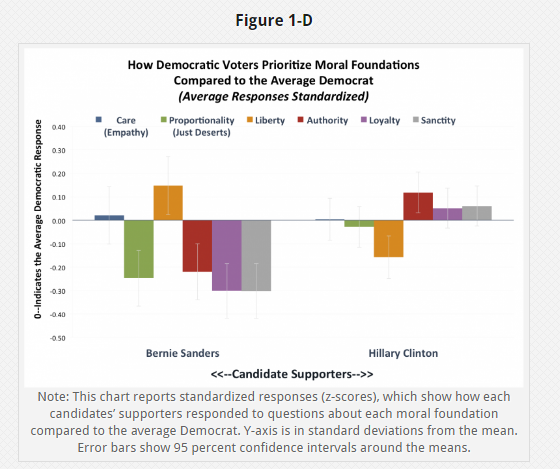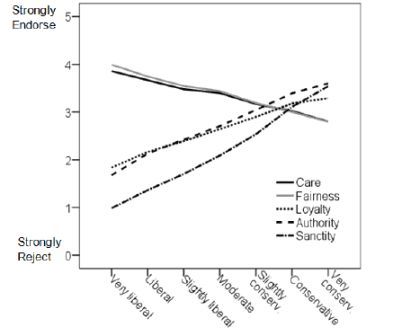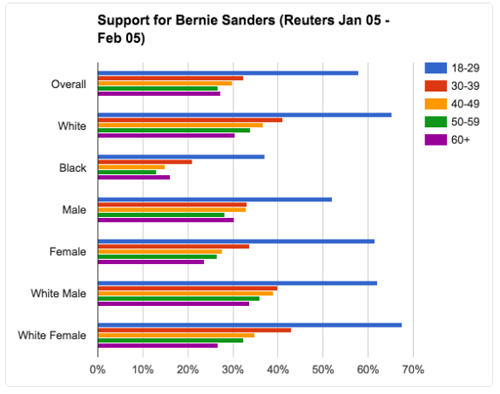Or, Why We’re Doomed, Part the Infinity …
A few days ago, this happened:
In Boston on Sunday night, former Democratic presidential candidate Bernie Sanders asked Democrats to pay close attention to the lessons of the election, arguing that the party needs to have a reckoning about why it lost.
“The working class of this country is being decimated — that’s why Donald Trump won,” Sanders said. “And what we need now are candidates who stand with those working people, who understand that real median family income has gone down.”
The Vermont senator spoke to a sold-out crowd of more than 1,000 mostly young people at the Berklee Performance Center, promoting his book, “Our Revolution: A Future to Believe In.”
Asked by a questioner how she could become the second Latina senator in U.S. history, Sanders said a candidate’s gender or race isn’t enough.
“I have to know whether that Latina is going to stand up with the working class of this country and is going to take on big money interests,” Sanders said.
He added:
[H]ere is my point — and this is where there is going to be a division within the Democratic Party. It is not good enough for somebody to say, ‘I’m a woman, vote for me.’ No, that’s not good enough. What we need is a woman who has the guts to stand up to Wall Street, to the insurance companies, to the drug companies, to the fossil fuel industry.
In other words, one of the struggles that you’re going to be seeing in the Democratic Party is whether we go beyond identity politics. I think it’s a step forward in America if you have an African-American CEO of some major corporation. But you know what, if that guy is going to be shipping jobs out of this country, and exploiting his workers, it doesn’t mean a whole hell of a lot whether he’s black or white or Latino.
Here are his extended remarks, in full:
Let me respond to the question in a way that you may not be happy with. It goes without saying that as we fight to end all forms of discrimination, as we fight to bring more and more women into the political process, Latinos, African Americans, Native Americans — all of that is enormously important, and count me in as somebody who wants to see that happen.
But it’s not good enough to say, “Hey, I’m a Latina, vote for me.” That is not good enough. I have to know whether that Latina is going to stand up with the working class of this country, and is going to take on big money interests.
One of the struggles that we’re going to have right now, we lay on the table of the Democratic Party, is it’s not good enough to me to say, “Okay, well we’ve got X number of African Americans over here, we’ve got Y number of Latinos, we have Z number of women. We are a diverse party, a diverse nation.” Not good enough. We need that diversity, that goes without saying. That is accepted. Right now, we’ve made some progress in getting women into politics — I think we got 20 women in the Senate now. We need 50 women in the Senate. We need more African Americans.
But, but, here is my point, and this is where there is going to be division within the Democratic Party. It is not good enough for someone to say, “I’m a woman! Vote for me!” No, that’s not good enough. What we need is a woman who has the guts to stand up to Wall Street, to the insurance companies, to the drug companies, to the fossil fuel industry. In other words, one of the struggles that you’re going to be seeing in the Democratic Party is whether we go beyond identity politics. I think it’s a step forward in America if you have an African-American head or CEO of some major corporation.
But you know what? If that guy is going to be shipping jobs out of this country and exploiting his workers, it doesn’t mean a whole hell of a lot if he’s black or white or Latino. And some people may not agree with me, but that is the fight we’re going to have right now in the Democratic Party. The working class of this country is being decimated. That’s why Donald Trump won. …
We need candidates — black and white and Latino and gay and male — we need all of that. But we need all of those candidates and public officials to have the guts to stand up to the oligarchy. That is the fight of today.

Now, that seems to me to be clear and sensible. However …
Talking Points Memo — and I usually respect Talking Points Memo — published an article about this talk under the headline “Sanders Urges Supporters: Ditch Identity Politics and Embrace the Working Class.” The article began:
In a speech Sunday, Sen. Bernie Sanders (I-VT) urged attendees to move away from “identity politics” and towards policies aimed at helping the working class.
And the shitfest was on.
If you’ve already read what Sanders said, you will know that TPM got it wrong. But the damage was done. Those predisposed by the headline to be angry seized on these remarks to claim Sanders is a racist who wants to favor the needs of white blue-collar workers over the cause of racial and gender justice. And, of course, that is plainly not what he said, but people in the grip of Righteous Outrage can’t read. Even when you patiently point out to them what he actually said, they still see racism.
Plus, a number of people took the quote “It is not good enough for somebody to say, ‘I’m a woman, vote for me.’ No, that’s not good enough” to be a dig at Hillary Clinton, which set up another shitstorm from Hillary supporters who still blame Sanders for her loss. (As this guy forcefully mansplains to a group of mostly women arguing in favor of Sanders’s position.)
See also: This, this, and this.
This is why we can’t have nice things. I’m sure part of the problem is that it can’t be easy for people of color to consider having to make common cause with working-class whites. But as this election ought to have shown us, if that common cause doesn’t happen, eventually the Democrats won’t be able to win elections outside of San Francisco and Brooklyn.
(Right now a lot of people are clinging to Clinton’s growing popular vote victory to assure themselves that the people really love her, and if it weren’t for Comey and a few other things she would have squeaked out an Electoral College victory, too. But I’m sure it’s also true that if the Republicans had nominated a less odious candidate than Donald Trump, the GOP would have won in a landslide. The real message of this election isn’t that racists elected Donald Trump but that way too many people didn’t vote at all. You could argue that both candidates lost the popular vote.
A few weeks ago Thomas B. Edsall wrote in the New York Times that the Democrats are no longer a “class-based coalition” with an economic agenda, but a loose coalition of “upscale well-educated whites” mostly cut off from the rest of America plus African-American and Latino voters in big cities. Clinton’s lopsided victories in urban liberal coastal states show us he was pretty much right.)
Sanders attempted to clarify his position in this article:
The Democratic Party is the party of diversity. We have proudly led the fight against racism, sexism, homophobia, xenophobia, and for the rights of immigrants. Especially under a Trump administration, we are not turning back. We are going forward. There can be no compromise on bigotry.
Our job is to expand diversity. We want more women, more African-Americans, more Latinos, and individuals of all ages, colors and creed to be involved in the political process. But to think of diversity purely in racial and gender terms is not sufficient.
Yes, we need more candidates of diversity, but we also need candidates?—?no matter what race or gender?—?to be fighters for the working class and stand up to the corporate powers who have so much power over our economic lives. We need all of our candidates to have the courage to stand up to the Koch Brothers, Wall Street, drug companies, insurance companies, oil companies, and fight for working families?—?not just the top one percent.
(Note that Talking Points Memo linked to this article under the headline “Sanders Doubles Down.” Arghhh!)
Sanders concludes:
Our rights and economic lives are intertwined. Now, more than ever, we need a Democratic Party that is committed to fulfilling, not eviscerating, Dr. Martin Luther King’s dream of racial, social, and economic justice for all.
Clearly, he’s not saying that racial/gender issues must take a back seat to class issues; he’s saying that racial/gender and class issues are linked, and both must be addressed. Neither should be shoved aside in favor of the other.
Post-election, there have been attempts to divide the left between those who support identity politics and those who support class politics. But the two are often inextricable, given the large percentage of minorities in the working class. In his speech last night, Sanders made an argument for both kinds of politics.
This is the shitstorm that’s been eating up social media this week.
The New York Times got into it, too, with a “Room for Debate” page asking the question “Is Criticism of Identity Politics Racist or Long Overdue?” One individual argued for the priority of identity by assuming that class/economic issues would necessarily drive out identity issues.
We have a long history in this country of responding to the suffering of “working class whites” not by leveling the playing field for everyone, but by maintaining their status above people of color and immigrants. The labor movement, the New Deal, the G.I Bill, are just three examples.
And of course those examples are valid, but they are also from several decades ago. Most people alive today weren’t yet born when those things happened. Our culture really has shifted quite a bit since then, race-wise.
And I don’t see anybody on the independent progressive Left or from within the Democratic Party arguing for compromising on racial and gender equality to advance economic equality. The argument is that we have to do both, or we’ll never accomplish either one.
Some of the other commenters in this New York Times section make the argument that increasing economic inequality combined with the Democrats’ consuming focus on identity politics is increasing racial resentment. It’s making racism worse, in other words. There may be some truth in that. Conversely, IMO, rallying working people of all races around a common cause might actually alleviate some of the racism. We really are all in this together.
Finally, journalist Michelle García wrote,
The attack on political correctness fits within the brand of identity politics Donald Trump exploited during his campaign. Mr. Trump’s victory relied on fusing a culture of racism and sexism with economic anxieties and the backlash against neoliberalism. Economic challenges are real, demographic changes are real. Mr. Trump seized them to peddle well-worn cultural myths of a nation under siege by the Mexican menace, “bad hombres,” Muslims and other cultural “outsiders.”
Victimhood was contained in the message that America was once great, but no longer. His message imbues victims with unquestioned virtue and obliterates the needs, indeed the humanity, of everyone else.
Ms. García is criticizing right-wing demagoguery and reminding us that the Right has its own version of “identity politics.” But it struck me that some on the Left and/or in the Democratic Party are in danger of falling down the same rabbit hole. Some have taken on the righteous mantle of unquestioned virtue that obliterates any perspective but their own. They trash the rest of us as racist, sexist troglodytes interested only in enhancing the status of white guys.
They aren’t listening, in other words. The lessons of his election are not being learned, I fear.




